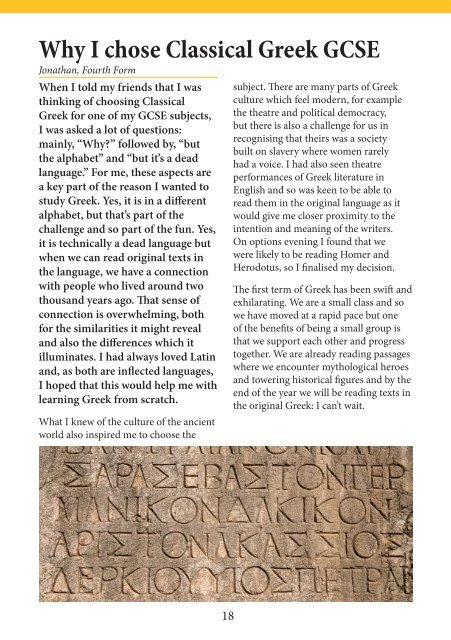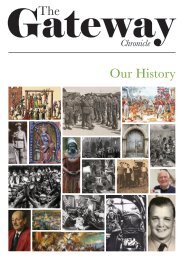You also want an ePaper? Increase the reach of your titles
YUMPU automatically turns print PDFs into web optimized ePapers that Google loves.
Why I chose Classical Greek GCSE<br />
Jonathan, Fourth Form<br />
When I told my friends that I was<br />
thinking of choosing Classical<br />
Greek for one of my GCSE subjects,<br />
I was asked a lot of questions:<br />
mainly, “Why?” followed by, “but<br />
the alphabet” and “but it’s a dead<br />
language.” For me, these aspects are<br />
a key part of the reason I wanted to<br />
study Greek. Yes, it is in a different<br />
alphabet, but that’s part of the<br />
challenge and so part of the fun. Yes,<br />
it is technically a dead language but<br />
when we can read original texts in<br />
the language, we have a connection<br />
with people who lived around two<br />
thousand years ago. That sense of<br />
connection is overwhelming, both<br />
for the similarities it might reveal<br />
and also the differences which it<br />
illuminates. I had always loved Latin<br />
and, as both are inflected languages,<br />
I hoped that this would help me with<br />
learning Greek from scratch.<br />
What I knew of the culture of the ancient<br />
world also inspired me to choose the<br />
subject. There are many parts of Greek<br />
culture which feel modern, for example<br />
the theatre and political democracy,<br />
but there is also a challenge for us in<br />
recognising that theirs was a society<br />
built on slavery where women rarely<br />
had a voice. I had also seen theatre<br />
performances of Greek literature in<br />
English and so was keen to be able to<br />
read them in the original language as it<br />
would give me closer proximity to the<br />
intention and meaning of the writers.<br />
On options evening I found that we<br />
were likely to be reading Homer and<br />
Herodotus, so I finalised my decision.<br />
The first term of Greek has been swift and<br />
exhilarating. We are a small class and so<br />
we have moved at a rapid pace but one<br />
of the benefits of being a small group is<br />
that we support each other and progress<br />
together. We are already reading passages<br />
where we encounter mythological heroes<br />
and towering historical figures and by the<br />
end of the year we will be reading texts in<br />
the original Greek: I can’t wait.<br />
mundus senescit at gens maturescit<br />
John Ellis, Fourth Form<br />
Despite all the hardship it has<br />
left in its wake, the COVID-19<br />
pandemic has provided an almost<br />
unprecedented opportunity for us<br />
as a society to pause and reflect on<br />
our past, present and future. Most<br />
notably following the death of<br />
George Floyd, the rapid expansion<br />
of the Black Lives Matter Movement<br />
has led to numerous institutions<br />
across the world examining their<br />
own diversity and/or links to slavery<br />
and racism. However, there is one<br />
key question posed at this time:<br />
‘Is there validity in judging the<br />
actions of the past in the eyes of the<br />
present?’<br />
Although many have pointed fingers<br />
at the British Empire for its central<br />
role in the Transatlantic Slave Trade<br />
and colonialism, all of the world’s<br />
most powerful empires were built and<br />
sustained on the backs of slavery and<br />
oppression and, therefore, it is important<br />
to recognise this also. As a Classicist, I<br />
take a keen interest and fascination in the<br />
structure and civilisation of the Roman<br />
Empire. Nevertheless, this does not go<br />
without my own criticism of a leader<br />
who often painted himself as the greatest<br />
in history: Gaius Julius Caesar. Now it is<br />
needless to say that Julius Caesar was one<br />
of the most extraordinarily resourceful<br />
and talented military minds that Europe<br />
has ever seen but his integrity falls short<br />
of his achievements. The mass genocide<br />
committed by Caesar in the Gallic Wars<br />
is completely and utterly unacceptable<br />
in the lens of our modern society but,<br />
just as Caesar and many of those around<br />
him seemed to be very potent in clearing<br />
their consciences, should we be able<br />
to forgive and forget simply because it<br />
happened so long ago? Likewise, the<br />
role of slavery in the Roman Empire was<br />
central to its expansive economy. On the<br />
contrary to common argument, however,<br />
this institutionalisation of slavery did<br />
not go unquestioned or seen as normal<br />
by all at the time. In Gaius’ Institutiones<br />
(161 AD), he refers to the domination<br />
of another person in the case of slavery<br />
18 19


















